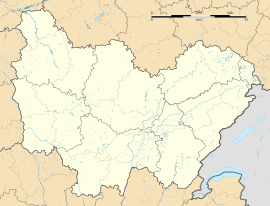Theil-sur-Vanne facts for kids
Quick facts for kids
Theil-sur-Vanne
|
|
|---|---|
| Country | France |
| Region | Bourgogne-Franche-Comté |
| Department | Yonne |
| Arrondissement | Sens |
| Canton | Villeneuve-l'Archevêque |
| Area
1
|
11.55 km2 (4.46 sq mi) |
| Population
(2006)
|
552 |
| • Density | 47.79/km2 (123.78/sq mi) |
| Time zone | UTC+01:00 (CET) |
| • Summer (DST) | UTC+02:00 (CEST) |
| INSEE/Postal code |
89411 /89320
|
| Elevation | 86–222 m (282–728 ft) (avg. 90 m or 300 ft) |
| 1 French Land Register data, which excludes lakes, ponds, glaciers > 1 km2 (0.386 sq mi or 247 acres) and river estuaries. | |
Theil-sur-Vanne is a small commune located in the Yonne department. This area is found in the central part of France. It is a quiet place with a small population.
Contents
Theil-sur-Vanne: A French Commune
Theil-sur-Vanne is known as a commune in France. A commune is the smallest unit of local government in the country. Think of it like a town or a village. It has its own local council and a mayor who helps run things.
Where is Theil-sur-Vanne?
Theil-sur-Vanne is located in the Yonne department. This department is part of the Bourgogne-Franche-Comté region in central France. The commune covers an area of about 11.55 square kilometers. Its elevation, or how high it is above sea level, ranges from 86 meters to 222 meters.
How Many People Live Here?
As of 2006, Theil-sur-Vanne had a population of 552 people. This makes it a very small community. Small communes like this often have a close-knit feel.
What is a Commune?
A commune is a basic administrative division in France. It's like a local area with its own government. Every part of France is part of a commune. They handle local services and decisions for their residents.
Local Government
Each commune has a mayor and a municipal council. The mayor is the head of the local government. They are responsible for managing the commune's affairs. This includes things like local roads, schools, and public services. The term "intercommunality" refers to when several communes work together. They might share services like waste collection or public transport. This helps them be more efficient.
See also
 In Spanish: Theil-sur-Vanne para niños
In Spanish: Theil-sur-Vanne para niños
 | Janet Taylor Pickett |
 | Synthia Saint James |
 | Howardena Pindell |
 | Faith Ringgold |



